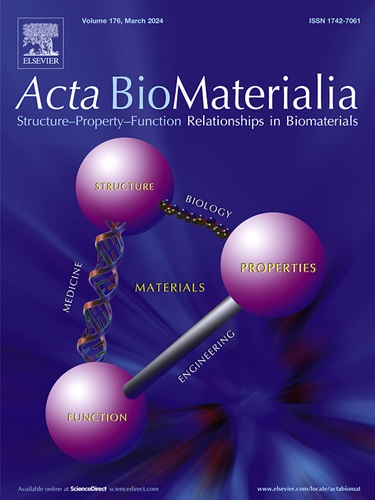Obesity prolongs the pro-inflammatory response and attenuates bone healing on titanium implants
IF 9.4
1区 医学
Q1 ENGINEERING, BIOMEDICAL
引用次数: 0
Abstract
Obesity is a metabolic disease resulting from excess body fat accumulation associated with chronic systemic inflammation. Obesity has been shown to impact the function and activity of neutrophils, macrophages, and T cells, contributing to higher circulating levels of pro-inflammatory cytokines. Biomaterial surface properties such as roughness and hydrophilicity can influence the behavior of immune cells in the peri-implant microenvironment. This study aimed to determine how obesity induced by a high-fat diet (HFD) affects the inflammatory response to modified titanium (Ti) implants and subsequent bone formation. Obese mice had significantly more neutrophils, pro-inflammatory macrophages, and T cells and fewer anti-inflammatory macrophages and mesenchymal stem cells (MSCs) in the peri-implant tissue than lean mice. Obesity also increased circulating adipokines and pro-inflammatory cytokines when compared to lean animals. Bone formation around Ti implants was reduced in obese mice compared to controls. Adoptive transfer of bone marrow cells isolated from obese mice into wild-type mice demonstrated the localized impact of obesity on immune cell function and phenotype, promoting a pro-inflammatory peri-implant microenvironment and attenuating bone formation post-implantation. These results show that obesity significantly affects the inflammatory response to modified Ti implants, prolonging the pro-inflammatory response to the implanted biomaterial and compromising bone formation.
Statement of significance
Obesity has been shown to significantly alter physiological processes, including the behavior of immune cells, inducing a state of systemic chronic inflammation. Our study demonstrates that obesity-induced via a high-fat diet alters immune cell response to implanted biomaterials, with increased pro-inflammatory response and attenuated immunomodulation that results in decreased biomaterial integration.

肥胖会延长钛植入物的促炎反应并减弱骨愈合。
肥胖症是一种代谢性疾病,是由于体内脂肪堆积过多并伴有慢性全身性炎症所致。研究表明,肥胖会影响中性粒细胞、巨噬细胞和 T 细胞的功能和活性,导致循环中促炎细胞因子水平升高。粗糙度和亲水性等生物材料表面特性会影响种植体周围微环境中免疫细胞的行为。本研究旨在确定高脂饮食(HFD)诱导的肥胖如何影响对改良钛(Ti)植入物的炎症反应以及随后的骨形成。与瘦小鼠相比,肥胖小鼠种植体周围组织中的中性粒细胞、促炎巨噬细胞和T细胞明显增多,而抗炎巨噬细胞和间充质干细胞(MSCs)则较少。与瘦小动物相比,肥胖还增加了循环脂肪因子和促炎细胞因子。与对照组相比,肥胖小鼠 Ti 植入体周围的骨形成减少。将从肥胖小鼠体内分离出的骨髓细胞收养转移到野生型小鼠体内,证明了肥胖对免疫细胞功能和表型的局部影响,促进了种植体周围的促炎微环境,并削弱了种植后的骨形成。这些结果表明,肥胖会严重影响改良 Ti 植入物的炎症反应,延长植入生物材料的促炎症反应,影响骨形成。意义说明:肥胖已被证明会显著改变生理过程,包括免疫细胞的行为,诱发全身慢性炎症。我们的研究表明,通过高脂饮食引起的肥胖会改变免疫细胞对植入生物材料的反应,促炎反应增加和免疫调节减弱会导致生物材料整合能力下降。
本文章由计算机程序翻译,如有差异,请以英文原文为准。
求助全文
约1分钟内获得全文
求助全文
来源期刊

Acta Biomaterialia
工程技术-材料科学:生物材料
CiteScore
16.80
自引率
3.10%
发文量
776
审稿时长
30 days
期刊介绍:
Acta Biomaterialia is a monthly peer-reviewed scientific journal published by Elsevier. The journal was established in January 2005. The editor-in-chief is W.R. Wagner (University of Pittsburgh). The journal covers research in biomaterials science, including the interrelationship of biomaterial structure and function from macroscale to nanoscale. Topical coverage includes biomedical and biocompatible materials.
 求助内容:
求助内容: 应助结果提醒方式:
应助结果提醒方式:


